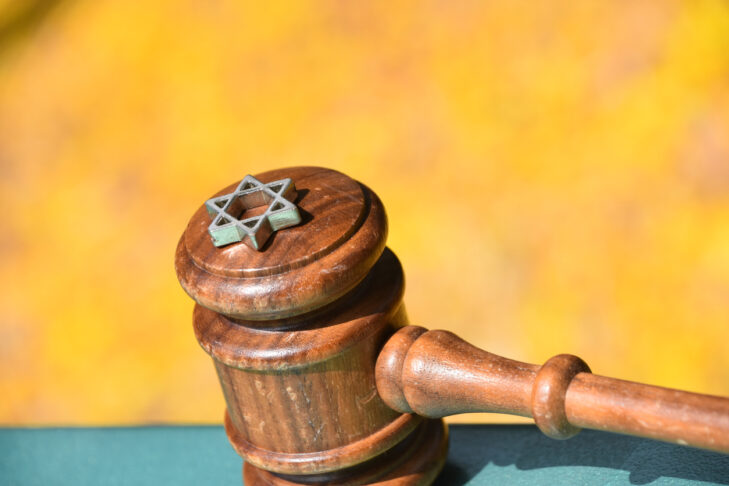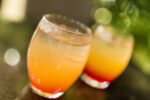THE LAWYERS’ HAGGADAH
[ANNOTATED]
Passover is the Jewish festival of freedom, celebrated through ritual, symbolism and extreme overeating. The keystone is the “seder,” an orderly meal directed by a guidebook called a “Haggadah.” Because many lawyers are Jewish, and because, without a code or rule book (i.e., the Haggadah), those lawyers can be like a fish (e.g., gefilte) out of water (The Red Sea et. al.), here is the first Haggadah designed for the legal profession (and such Jewish members as are attached thereto or incorporated therein).
ORDER
The Passover seder has multiple parts (which term encompasses any and all segments, steps and components hereof), including, but not limited to, the following (as they may be modified, revised or amended, from time to time, by rabbinical or other rightful authorities, whether now known or hereafter anointed):
- Kaddesh: We recite the blessing over the dry martini. Make it a double.
- Urchatz: We recall the Code of Ur, one of the earliest legal codes, which preceded Hammurabi’s by 300 years.
- [Ed. Note: At this mention, some celebrants chant: “Take THAT, Hammurabi!”]
- [Ed. Note: But not many, since Hammurabi beat Moses by 1,000 years.]
- Karpas: We celebrate the Ur law requiring that each car pass on the left (“If a man passeth on the right, he shall pay two shekels of silver, and the other driver may key his vehicle.”)
- Yachatz: We commit assault and battery on a matzah.
- Maggid: We retell the story of the Israelites’ departure from Egypt in excruciating detail, yet barely mentioning the hero Moses.
- [Ed. Note: This seems ungrateful, except modern scholars now believe that, rather than the Bible’s 2 million Hebrews, Moses traveled to Israel with a small group.]
- [Ed. Note: Possibly just Mrs. Moses.]
THE SEDER PLATE
The seder plate contains the following symbolic items:
- Parsley: This symbol of nature reminds lawyers to stop and smell the herb gardens (while avoiding unlawful entry or trespass).
- Bitter herbs: This reminds us that many lawyers, including some named “Herb,” must endure the bitterness of non-equity partnership.
- Egg: This symbol of cholesterol cautions us that partners who routinely spend their marketing budgets at Michelin-starred restaurants may take on a Humpty-Dumpty shape.
- Shank bone: This is a reminder that every law firm has someone who knows where the bodies are buried. [Ed. Note: Watch your back!]
- Charoset: This paste, composed of apples, nuts and wine, reminds us that a successful law firm (or TV law drama) needs lawyers who stick together. [Ed. Note: Alcohol also helps.]
- Orange (optional): This reminds us that for years the legal field excluded women, just like the seder plate excluded oranges. [Ed. Note: Until Jews flocked to Florida and seder plates began to display oranges, sunscreen and mahjong tiles.]
KIDDUSH
Related
These four glasses represent continuously escalating intoxication, ending when you can’t tell the difference between Moses and a burning bush. [Ed. Note: This is known to Jewish lawyers as DUI, or “Davening Under the Influence.”]
Before drinking each glass, we recite a special blessing: “Praised be Thou, Our Lord or Ladyship, Who created fruit, including grapes, which can be fermented into wine, which can be shipped in interstate commerce (pursuant to the 21st Amendment), which can be regulated by blue laws (held constitutional in Braunfield), and which my father bought for two zuzim (the Schnorrer!). AMEN.”
THE FOUR CHILDREN
The Torah speaks of four children: The Wise, The Wicked, The One Who Is One Vest Shy of a 3-Piece Suit, and The One Who Doesn’t Know How to Track Billable Hours.
To the Wise One, who aced the LSATs, what do you say? “If you’re so smart, how come it took you six tries to get yesterday’s Wordle?”
To the Wicked One, who constantly shouts, “I object,” what do you say? “By objecting, you bring disrespect on your partners … especially the ones who forgot to object. Stop that.”
To the Foolish One, who had to retake the bar exam twice, what do you say? “Don’t worry, no client will ask if you passed on the first try.” Then add ominously: “But if you fail again, we withdraw the job offer.”
And to the One Who Doesn’t Know How to Ask a Question, what do you say? “Take a class on interrogatories, you nitwit. And don’t ask questions to which you don’t know the answer!” Then allude to O.J.’s glove.
THE FOUR INTERROGATORIES
Why is this night different from all other nights?
- On all other nights we accept personal injury work. Why on this night do we refuse to take cases on contingency and require a huge retainer?
- On all other nights we take our martini extra dry. Why on this night do we add two olives and call it “dirty” … all while wearing a little beanie?
- On all other nights we say things like “why,” “from now on,” and, “I got paid.” Why on this night do we, led by the lawyer guests, speak in a neo-Shakespearean dialect and instead say: “wherefore,” “hereinafter,” and, “For one dollar ($1.00) and other good and valuable consideration, the receipt and sufficiency which are hereby acknowledged”? [Ed. Note: Really, why? Do lawyers think they are paid by the syllable?]
- On all other nights we end the meal with heartburn or indigestion. Why on this night do we have both heartburn and indigestion?
- Some lawyers add a special fifth question: All other writing pads are white and 11” in length. Why are legal pads yellow, 14” long, and impossible to fit in most file cabinets?
THE TEN LAWYER PLAGUES
The Bible describes the 10 plagues that were visited upon the Egyptians. These are the 10 plagues that harry modern lawyers:
- Law School Debt
- Socratic Professors
- Billable Hours
- Latinate Phrases
- Insufficient Retainers
- Deadbeat Clients
- Malpractice Premiums
- Disciplinary Proceedings
- Peremptory Challenges
- Slaying of the Tax-Deductible 2-Martini Lunch
FESTIVE MEAL
Settle in for a multi-course, multi-dish food extravaganza. This is also a great time for discourse; here are several more questions to consider:
- If you discuss a client’s matter over dinner, (1) have you violated ethical rules, even if you cleverly disguise identities (“Let’s call our client “Shmeye-B-M”), and (2) can you bill the meal to the client, or merely deduct it as a business expense?
- Would God bringing us out of Egypt, without punishing the Egyptians for criminal enslavement, really have been enough (Dayenu!), or would we have filed appeals for generations?
- Why couldn’t God have shortened both Deuteronomy (all those laws!) and the Sabbath, so we could shop the mall on Saturdays?
- Many Haggadahs describe Rabbi Eleazar ben Azaryah as “like a man of seventy.” How so? Nose hair? Grandpa jeans? Also, if “all the days of your life” includes the nights, does “all the tea in China” include Taiwan?
- If you assume a 1.07% inflation rate since the 16th century, what are two zuzim worth in today’s dollars?
CONCLUSION
Many lawyers recite a final blessing: “Bless You, Lord, THE Chief Justice of the TRULY Supreme Court, Who enables judges to end their work day at 3-4 p.m., which enables lawyers to get home in time for the seder, and, in the diaspora, two seders. [Ed. Note: Though the second is usually shorter and less enthusiastic.] Amen.”
It is customary to conclude with the hope: “Next year in Jerusalem.” But we are lawyers, so we substitute: “See you in court!” (But we say it with a smile, so everyone knows we don’t mean it and will instead petition for arbitration.)
This post has been contributed by a third party. The opinions, facts and any media content are presented solely by the author, and JewishBoston assumes no responsibility for them. Want to add your voice to the conversation? Publish your own post here. MORE





